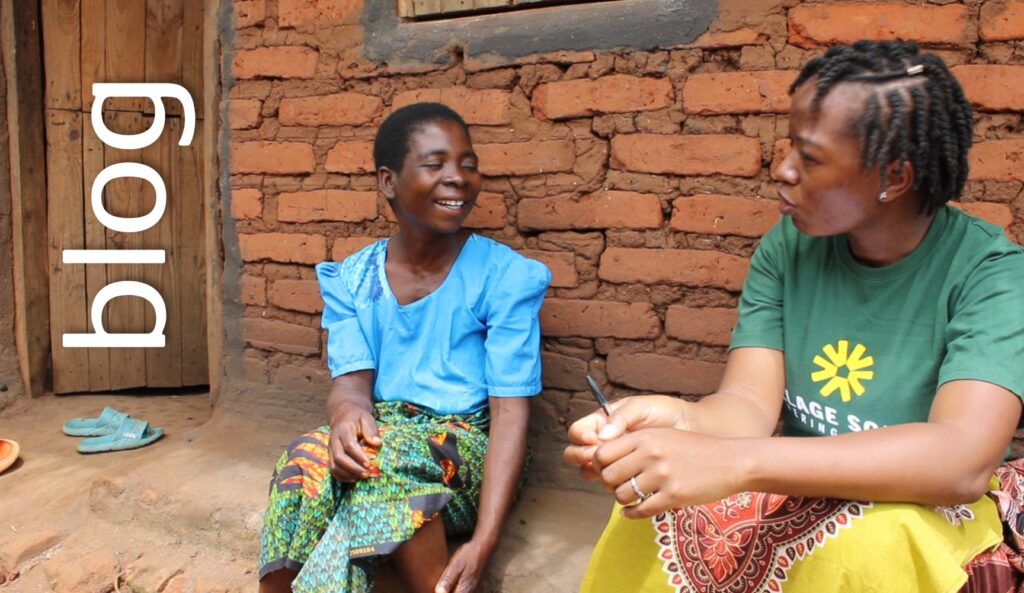by Susanna Simango from Malawi
“We don’t have any food to eat in the house,” Eveless sighed, her words were heavy with worry. “My husband didn’t find any casual work in the crop fields today, so we will have to accept it and go to bed hungry again tonight. We boiled some green maize for lunch, but that was the last of it.”
I sat with Eveless outside her house on the small veranda, trying to escape the scorching sun. Thankfully, the shadow cast by the thatched roof provided us with some relief from the heat that afternoon. It was the village chief who introduced me to Eveless, a mother of three. I went to Mtambo Village that day to learn about the challenges being faced by women like her in rural communities.
How much money does your husband make from working in the farming fields?” I asked, curious about the financial strain her family is facing.
“It’s unpredictable,” she replied with a sigh. “Some days he earns enough to put food on the table which is about $1.75, but other times, we barely make enough to cover our expenses for the day.” She pointed towards the surrounding fields. “People living in town come here to rent or buy land to cultivate crops, but it’s seasonal,” she explained. “During the cropping season from December to May, there’s plenty of work, but once the season ends, finding steady employment becomes a challenge.”
We heard a cry inside the house, it was her 18 month old baby waking up from her nap. She went inside to grab her. As she settled back down, she began to breastfeed her baby. “A lot of villagers have sold their land,” Eveless continued, her voice carrying a weight of sorrow. “With each passing year, more and more families are forced to part with their ancestral lands in search of money, but it never lasts.”
“Did you sell your land as well?” I asked. “Not me,” Eveless replied. “My family members sold it and left me a small portion to farm on. There was a time I went away for a while, following my mother to the big estates in Kasungu. When I came back, I found my relatives had sold it.”
“Life is hard in the Village. Women have no say over anything,” she said.

In Malawi, women often have little say in land matters, even when they rightfully own it. While the country’s laws advocate for gender equality in land rights, deep-seated social and gender norms still block women from accessing, owning, and managing land as they should. “I used my savings from working in fields to start a business selling dry fish. But the business collapsed. The needs of my family are great, and our small business couldn’t sustain it.” As I continued to listen to Eveless, a sudden gust of wind blew past, causing a small piece of grass from the thatched roof to fall on my notepad where I was taking down some notes. I looked up, and I noticed that there was hardly any grass covering left on one section of the roof
Eveless noticed my gaze on her roof. “Our roof needs maintenance; it leaks,” she stated plainly. “Maybe one of these days I will be able to earn enough money and put up iron sheets.”
Do you have any other source of income?” I asked, curious about her financial situation. “Well, we get some income from farming on our 0.5 acres land where we grow crops for food and sell the excess. “Last year we ended up having to sustain ourselves by harvesting some of the maize while it was still green, and we sold some for money. By the time it dried up, we only managed to harvest two bags, which were milled into flour” she added. A herd of goats came near where we were seated, and Eveless got up to chase them away. Curious, I asked her who the goats belonged to.
“They belong to our neighbour over there,” Eveless pointed out, gesturing towards a house covered with iron sheets, a sign of relative prosperity in rural communities. “They are well-off. The family are tobacco farmers and own a grocery shop.”
“I would like to start my fish business again so that I can put iron sheets on my house too and be able to pay school fees for my children,” Eveless continued. “My son failed to attend classes last term due to lack of fees. My husband is not from this village and in case he divorces me, I would like to be financially independent and be able to take care of my kids in the future” she narrated, expressing her hopes and concerns for her family’s future.
“Have you attended any type of business training before?” I asked to understand her background and experience in entrepreneurship.
“No,” she replied.
“How much time did you dedicate to your fish business?” I asked.
“Well, that’s the thing,” she sighed. “Between caring for the kids and my husband’s working in farms, I rarely had the chance to go to the market.”
“The convenience of the fish business is that I can manage it from home,” she explained. “I simply display the fish on a bench outside, and neighbours come to buy. Now that the kids are grown,” she reflected, “perhaps I can explore taking the fish to markets to expand our income.”
Learn more about Susanna’s work at: https://www.villagesolar.org



